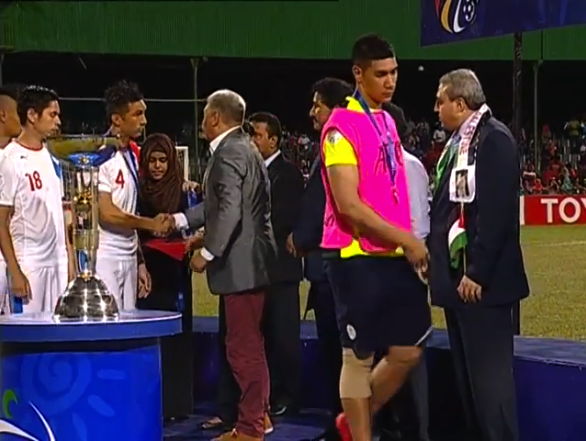The conquest of Palestine in Friday’s Asian Football Confederation (AFC) Challenge Cup is more than a feel good story—over and beyond the action on the pitch, this nation split in half by neighboring Israel has sent a message for the world to read: We want peace.
That message was sent through dizzying dribbling, finesse footwork, strategic positioning, and airtight defense which shattered the football dreams of the Philippines, 1-0, in the finals of the Challenge Cup in Male.
Such gameplay, while they may be accused (for obvious reasons) for parking the bus, nay, the ship against all of their opponents, only shows that football is part of the Arab World’s cultural heritage as the lone Arab nation in the Challenge Cup will be grouped along with two neighbors—Iraq and Jordan—in the 2015 AFC Asian Cup.
Furthermore, Palestine is the only national team in the Challenge Cup that did not concede a single goal, even if all of their six goals in the tournament came only from their two ace strikers, Ashraf Al-Fawaghra (who scored Palestine’s lone goal, a 22-yard free kick, in the finals) and Abdelmahid Abuhabib.
Palestine exemplified the physical yet finesse brand of Arab football marked by precise diagonal passing and off-the-ball movement by the midfielders to set up their two strikers. This allowed them to dominate the game in terms of possessions and shots on goal in the first half, until they parked the bus in the second half to harass the Filipino charge.
Still, despite the loss, the tournament is still part of the continuing learning experience of the Philippines, especially now that they are co-bannered by two teenage defenders in the name of Filipino-Japanese Daisuke Sato and incoming Fighting Maroon Amani Aguinaldo, who made good accounts for themselves in their baptism of fire.
While the Philippines displayed a more precise passing game, especially from the flanks, they still succumbed to their old propensity for rushing for long balls. Not that it is a bad strategy, but such pulsating gameplay entails huge improvement in individual skills and communication in positioning, which the Azkals have yet to develop in the coming years. This is badly needed as for the past four years, the Philippine back row defense has solidly improved, thanks to the leadership of Rob Gier.
The Philippines must also learn from the quality dribbling skills used by Palestine against them, as dribbling can no longer be linear and dependent on speed and long balls in international competition. Again, the Azkals must be thankful to Palestine for teaching them valuable lessons in the finals.
As for Palestine, finally they can be known across Asia and across the world not for their national struggle against Israel, not for war and suffering, but for their football program. It is a chance for them to gain further recognition as a nation united through sports, despite division in borders. Such recognition historically boosts their fight for lasting peace and it is the triumph of the human spirit that football is instrumental in achieving their collective aspiration.




